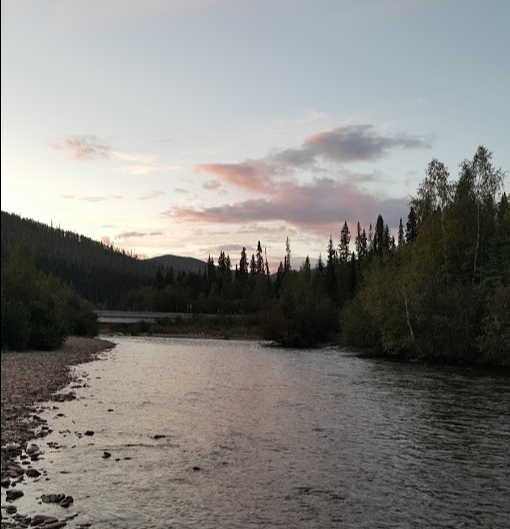By Dave Ammons
On her 60th birthday my mother led me to the summit of Mt. Elbert, the highest among Colorado’s fourteeners. She was a mountain goat, small and sinewy, always seeking challenges in the wilderness. She was also determined, reticent to concede to limitations, and stubborn to the core. Not long after that climb she began to experience the symptoms of what would later be diagnosed as Parkinson Disease, a burden that saddened her deeply but did not dampen her resolve.
As her condition became progressively worse over the years but prior to having to making the soul-crushing decision of assisted living, mom continued to fish. As with any outdoor endeavor she had learned quickly and evolved to an efficient fisher-woman with a pretty sweet cast. And she caught fish, which pleased her greatly. She was forever amazed by the patterns in nature and in trout. She didn’t talk much in the mountains, but she didn’t have to. She communicated through glistening eyes the joy she felt immersed in the profound splendor of the canyon and its living things.
One late summer afternoon we geared up to fish for a while. She was well-prepared in hip waders and an old vest, a variety of flies dangling from a tattered sheepskin fly patch, her bucket hat secured around her chin, and a gleam of anticipation in her expression. We walked out to the middle of the river in knee deep water and I stood at her shoulder as she took the first few casts. Within a few minutes I decided to push upstream and we agreed to meet somewhere in between as we worked the water for an hour or so.
Circling back after working a couple of stretches up river I didn’t see mom and figured she was just moving more slowly than I. No worries. After another hundred yards she came into view, standing in the exact spot as when we parted. Instead of believing she had found trout nirvana and had been pulling in fish after fish, I got the sinking feeling she hadn’t moved simply because she could not. She wasn’t casting, just holding her line in the water. Akinesia, a symptom of Parkinson’s where a person’s gait freezes, was the likely culprit. Hers was a full-on motor stop.
Mom played it cool as I approached.
“Hi mom.”
“Hi.”
“You been catching fish?”
“A few.”
“Did you try another spot?”
“No. This is a good spot.”
Damn how I admired her tenacity. I wanted to tell her it’s OK to open up, OK to admit she had been stuck but I knew better. Mom was an emotionally guarded woman. She didn’t like to express weakness, was reluctant to get too deep. I reached for her and gently cradled her elbow in my hand, an unspoken signal for us to head home and a touch which triggered movement. Alive again, she gathered line in her left hand, wristed a back cast up and across the riffle, and mended her line. Even at 70-something she remained agile and competent. Even as her hands trembled. Even as her body locked up in the middle of a Colorado mountain stream.
“Are you ready to go?”
“Mm-hmm,” she said.
We slowly waded to the shore for the walk to the her dad’s 1972 Dodge pickup parked in the gravel pullout on the road. We didn’t speak. It was not a time to talk about making changes, about not fishing by herself, about only casting from the banks, about the inevitability of things. We were both stubbornly fighting the notion of mortality. We remained quiet as we walked together, the lengthening shadows of a warm summer afternoon drawing the day to a close, a cloud of mayflies bumping about, but we were drawing a common conclusion— this disease ravaging her mind and her body and her soul meant her days wading the river were numbered.
She was right, it is a good spot. One can fish riffles on the approach from the near bank, or target submerged rocks mid-channel, or drift through a deeper run under a canopy of spruce leaning over the water whose roots were doing their best to claw their way towards stable ground. Eventually they will succumb to time and erosion. Sheep Creek spills through on the opposite bank carrying mysteries from beaver ponds unseen through thick stands of willow. Canyon walls hug both ground and sky. Elk ford the water here, trout forage, and sandpipers play in this good spot. And while something about this particular place in the river will always be the same, forever connected to a pause in time, forever linked to yet another realization that we are temporary, the forces of nature and life and love continue to alter all places moment by moment.
We never step in the same river twice.
Dave Ammons is a TU volunteer and a member of the Zane Grey Chapter in Arizona.



